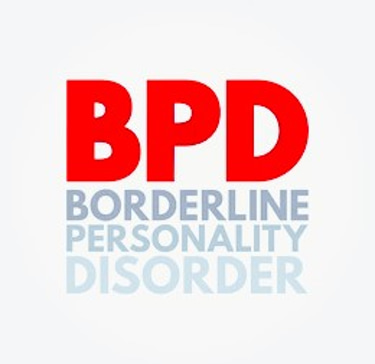BPD and Coping With Abandonment Fears
G Pacana
3/27/20254 min read


“Abandonment leaves a painful mark. It inks you for life, if you let it, making you believe you’re not worthy, leaving you distrustful of wishes and dreams, when they only disappoint.”
― Rochelle B. Weinstein
One of the most overpowering symptoms of BPD is the intense fear of abandonment. This fear can feel overwhelming, causing significant stress in relationships, both romantic and platonic. Understanding what fuels these fears and learning some simple strategies to manage them can be an effective way of getting through the worst times.
Understanding Abandonment Fears
People with BPD often experience a heightened sensitivity to rejection or abandonment, even if the perceived threat is minor. These fears can be triggered by something as simple as a friend not texting back quickly, or a partner being busy with work. While this may sound exaggerated to someone who doesn’t have BPD, it’s very real for those who do. The emotional response is often disproportionate to the actual situation, leading to feelings of panic, anxiety, and anger.
At the root of this fear is a deep-seated worry about being unlovable or unworthy. People with BPD might feel like they can’t trust others to stay, so the fear of being abandoned becomes all-encompassing. But it’s important to know that these feelings are just that—feelings. They don't define your worth, and they don't always reflect reality.
Coping Strategies for Abandonment Fears
Managing abandonment fears when you have BPD is no easy task, but it’s possible. Here are some strategies that may help you navigate these emotions:
1. Reality-Check Your Thoughts
When the fear of abandonment kicks in, it’s easy to jump to conclusions—like assuming someone is mad at you or that they’re going to leave you. In those moments, pause and ask yourself: Is this fear based on something real, or is it more about my emotional response to a situation?
You can also challenge the “all-or-nothing” thinking that BPD often brings. For example, just because a friend doesn’t respond to a text right away doesn’t mean they’re abandoning you. Maybe they’re busy, distracted, or going through their own stuff. Learning to slow down and evaluate situations without immediately jumping to the worst-case scenario can be a game-changer.
2. Ground Yourself in the Present Moment
It’s easy to spiral into the “what-ifs” and worst-case scenarios, but grounding techniques can help pull you back into the present. Some people with BPD find mindfulness exercises helpful. Try breathing deeply, focusing on your senses, or even repeating a mantra like, “I am safe in this moment.”
If you’re feeling particularly triggered, simple grounding exercises can interrupt the cycle of anxiety. Focus on what you can see, hear, or touch. These small actions can help calm your nervous system and bring you back to the present moment, rather than getting lost in fearful thoughts about the future.
3. Communicate Your Needs Openly
It’s essential to be open about your fears, but it’s also important to do so in a healthy, constructive way. Instead of assuming that someone will abandon you, try expressing how you’re feeling without blaming the other person. For example, saying something like, “I’m feeling really anxious right now, and I’m afraid you might leave me” is a more vulnerable and honest approach than acting out or withdrawing.
By opening up, you allow others to understand what you're going through, and it can help reduce the likelihood of misunderstandings. You might even be surprised by how supportive and understanding people can be when you communicate your feelings directly.
4. Develop Healthy Self-Worth
A big part of coping with abandonment fears is developing a sense of self-worth that doesn’t depend on others’ validation. This can be one of the most challenging aspects of BPD because, often, people with BPD look to others to fill the emotional void. But the more you can build internal self-validation—whether through self-care, journaling, or working on positive affirmations—the less overwhelming the fear of abandonment will feel.
Consider writing down qualities you love about yourself or things you’ve accomplished. Acknowledge that your value is not tied to whether or not someone stays in your life. Building this inner confidence doesn’t happen overnight, but it’s a powerful step toward reducing the impact of abandonment fears.
5. Seek Professional Support
Sometimes, the best way to cope with BPD and abandonment fears is to ask for help. Therapy, especially Dialectical Behavior Therapy, can be incredibly effective for those with BPD. DBT teaches skills like mindfulness, distress tolerance, and emotional regulation, which can be essential when dealing with the ups and downs of BPD.
If therapy isn’t an option, consider support groups or even journaling your thoughts and feelings. Just having a safe space to process can help alleviate some of the intensity of those emotions.
Living with BPD and the constant fear of abandonment isn’t easy, and it’s okay to feel overwhelmed at times. But remember: these fears do not define who you are, and they don’t have to control your life. By using strategies like reality-checking your thoughts, grounding yourself, communicating openly, and building healthy self-worth, you can learn to cope with these feelings in a more balanced way.
And remember, be patient with yourself, and don’t be afraid to reach out for support when you need it. You're stronger than you think, and you deserve the space to heal and thrive,
Source Material: Emotions Matter, BPDFamily, Out of the Fog
Copyright 2025 Psycnet, All Rights Reserved
